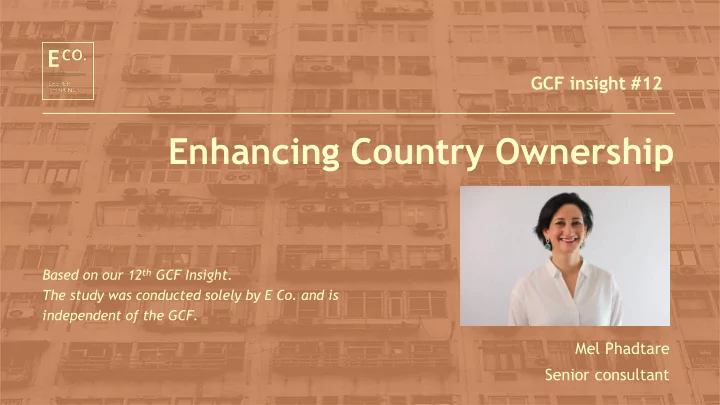

GCF insight #12 Enhancing Country Ownership Based on our 12 th GCF Insight. The study was conducted solely by E Co. and is independent of the GCF. Mel Phadtare Senior consultant
Why Country Ownership? P2 ▪ The GCF through its Governing Instrument provides that: “ The Fund will pursue a country-driven approach and promote and strengthen ▫ engagement at the country level through effective involvement of relevant institutions and stakeholders” Board meeting engagement: 4, 7, 8, 10, 11, 17, 21 ▫ Independent Evaluation Unit (IEU) assessing progress to date ▫ Direct Access Entities increasing from 42% to 55% ▫ Readiness Programme (266 approved) and Project Preparation Facility ▫ ▪ Required from project concept note to final M&E and beyond
What is Country Ownership? P3 Other responses: Four key results: ▪ Unnecessary bureaucracy Alignment with national priorities - 59% ▪ ▪ Great principle, hard to implement Autonomy/sovereignty in setting ▫ ▪ Increased national capacity regulations supported by climate ▪ Alignment with SDGs finance (14%) ▪ Locally owned businesses Local stakeholder engagement - 21% ▪ ▪ Better coordination of development NDAs taking ownership – 15% ▪ activities Knowledge sharing – 5% ▪ Limited input from external entities ▪ ▪ Supply of a no objection letter ▪ Success and sustainability
E Co. study: Enhancing Country Ownership P4 ▪ Aim: to explore the experiences, perspectives, challenges and recommendations from stakeholders ▪ Methodology: Online survey: 83 respondents - conducted in June 2019 ▫ 2 x Interviews: ▫ GCF Secretariat – Mr. Eduardo Freitas, Country Relations Manager ▫ ▫ CSO Representative – Mr. Tunga Bhadra Rai from the Climate Change Partnership Program, Nepal
Survey overview P5 ▪ 70% have experience with GCF projects, 30% with significant experience ▪ 83 respondents: National Designated Authorities (NDAs) – 27% ▫ Consulting firms and individuals – 24% ▫ Accredited Entities (excluding IAEs) – 20% ▫ Entities wishing to be accredited - 8% ▫ International Accredited Entities (IAEs) - 8% ▫ NGOs and public agencies – 13% ▫
GCF’s extent of addressing Country Ownership P6 44% of respondents say the GCF is doing ▪ reasonably well but with some shortcomings 20% said the GCF efforts to address issues ▪ of Country Ownership were comprehensive 16% said there were major shortcomings ▪ We have no breakdown on the shortcomings ▫
Stakeholder engagement P7 47% follow best practice ▪ 30% proactively inform ▪ 23% fail to build in beneficiary ▪ engagement for Country Ownership from the outset NDAs ranked higher towards following ▪ best practice, while consultants ranked lower, with accredited entities in between
Barriers and challenges P8 ▪ 64% respondents say low institutional capacity is the greatest barrier ▪ 15% believe requirements of the GCF exclude national stakeholders ▪ 8% cite a low project ambition
Other barriers P9 ▪ Time mobilisation ▪ Assumptions based on what Country Ownership can actually deliver on short notice ▪ Not a shared purpose with donors ▪ Corruption and mismanagement ▪ Engage as early as possible to optimise and enable a project preparation phase like the GEF
Accountability – other findings P10 ▪ Respondents signalled post-project approval requires more support ▪ Similarly, preliminary work of the GCF’s IEU, reveals a lack of reporting / consulting during the implementation stage ▪ Suggestions for how to overcome accountability issues or follow-through e.g. country ownership activities report, or rejection of proposals without an effective NDA structure
Accountability P11
Conclusions P12 1. GCF has demonstrated support and wants to see enhanced Country Ownership aligned with ambition and paradigm shift 2. Gaps exist in low institutional capacity , project ambition, and stakeholder engagement across the project cycle 3. A lack of coordination and collaboration between roles of NDAs/FPs, Accredited Entities and the Secretariat hinders country ownership opportunities
Recommendations P13 1. GCF support for donor/investor alignment with enhanced Country Ownership 2. GCF better understanding of Country Ownership shortfalls: provision of tools and mechanisms for post-project approval Country Ownership 3. The IEU will be presenting their findings to the Board at B.24 in November 2019, actionable change may be clarified
Recommend
More recommend